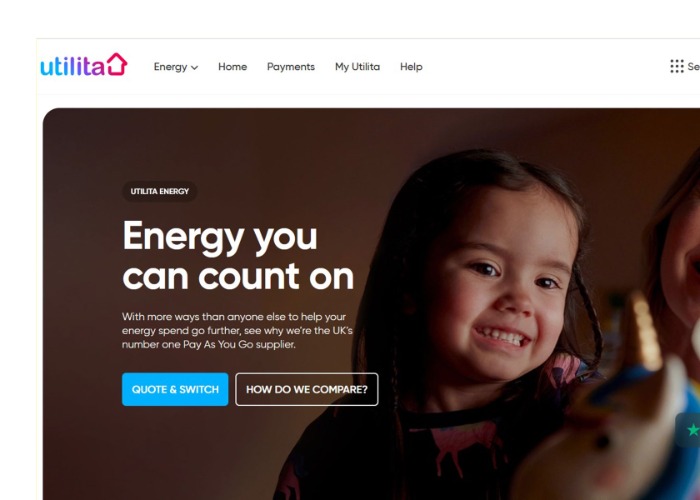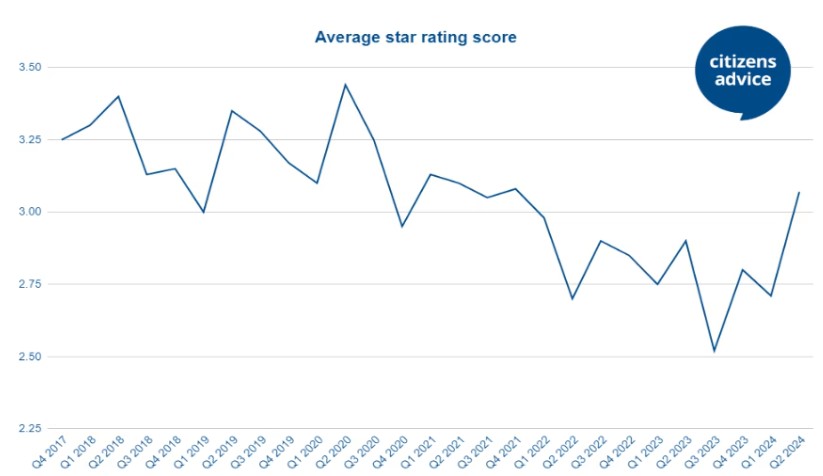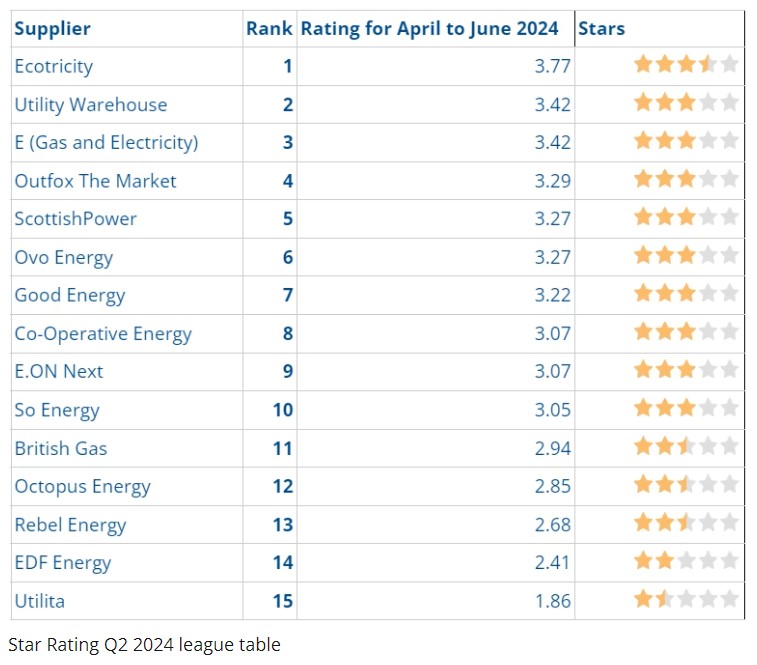Best and worst energy firms for customer service: Utilita bottom, Ecotricity top

Customer satisfaction levels remain well below other industries despite recent improvements.
Sections
Best & worst energy suppliers revealed
Three in five households are still served by energy suppliers with below-average customer service standards, new data has revealed.
Since late 2016, debt charity Citizens Advice has been publishing regular ratings for all suppliers with more than 25,000 customers to see how well they are faring specifically in terms of customer satisfaction.
It gives each a score out of five based on how it performs in terms of customer complaint levels, call waiting times, and commitment to helping customers in need.
As you can see from the graph below, ratings improved in the last quarter to finally reach levels seen before the energy crisis struck in 2021.
However, Citizens Advice chief executive Dame Clare Moriarty said the sector was still struggling lagging behind other sectors in terms of service.
“Whilst suppliers’ customer service improved in the Spring, firms need to continue upping their game to ensure people can access support in the colder months," she said.
“Citizens Advice has long called for a Consumer Duty to give [energy regulator] Ofgem stronger powers to ensure higher customer service standards in the energy industry, which is still far behind that of other sectors.

Utilita bottom bottom, Ecotricity top
The latest quarterly ratings, which cover April to June 2024, put Utilita last out of all 15 suppliers, with a score of just 1.86 out of five.
EDF Energy, second last in the table, was some distance ahead of Utilita with a score of 2.41 out of five.
Remarkably, ScottishPower was the only one out of the current Big Six energy suppliers to even feature in the top five, indicating the larger players have their work cut out for them when it comes to customer service.
Indeed it was Ecotricity, the relatively small green energy firm, that comfortably topped the ratings for the second quarter in a row with a score of 3.77.
It was followed by another small player in Utility Warehouse.
See the full ratings in the table below.

Unhappy with your supplier? Get moving
If you've been having no end of trouble with your supplier, you should seriously consider moving to a rival firm.
While the market isn't quite as competitive as before the energy crisis struck, there are still a bunch of suppliers looking to compete for your custom.
Energy deals: where to start
The first thing you need to do is shop around for a more suitable energy tariff.
As a rule of thumb, opting for 'dual fuel' (both electricity and gas from the same supplier) is generally cheaper than getting your energy from different suppliers.
Companies usually give hefty discounts on dual fuel tariffs and for paying by monthly Direct Debit. But it's worth doing your homework all the same.
The smartest way to find the best tariff is to use a price comparison service, which will hunt down the best deals, and tell you how much you can save compared to your current tariff.
To help you do this, you should have details of your current tariff to hand, including an up-to-date meter reading, as that will provide a more accurate comparison.
Sifting through the jargon
Once you've found the right deal to move to, it's time to switch. You'll be asked for your contact details, and will receive a confirmation email to let you know the switch is in progress.
If you're switching electricity supply, you'll also be asked for your Metering Point Administration Number (also known as the MPAN, your 'Supply number', or, for hardcore utilities fans, the 'S' number).
This can be found on your electricity bill with a large S in front of it, followed by a grid of 13 numbers. You'll only need to quote the numbers to your new provider.
Similarly, if you're switching your gas, you'll need to quote your Meter Point Reference Number, (MPRN or M number), which should also be printed on your gas bill.
If you can't find these numbers, contact your current energy supplier, who will be able to give these to you.
|
PROMOTION
|
||
|
Cooling-off period
Once you've switched, you'll have a cooling-off period of between seven and ten days to change your mind without penalty.
Once this has passed, your supplier will send you a welcome pack outlining your terms and conditions, or a standard letter followed by further information as your switch progresses.
You're likely to receive a lot of correspondence from both your new and old suppliers during the switch, so it's a good idea to keep anything received in a folder you can easily get to, should any queries arise.
In addition, it's important not to be complacent when it comes to switching.
In theory, after you've given over your details and a couple of meter readings, your new supplier should take care of all the formalities.
However, relying on the supplier can delay the switch.
It's wise to give your final meter reading to both your new and old supplier. Not only will this speed things up at both ends, but you'll be able to settle any outstanding amounts owed with greater ease.
In addition, cancel any direct debit arrangements – but only after you've paid your final bill, and make sure you let your bank(s) know too.
Will I be left without gas or electricity?
Thankfully no. As all the energy suppliers use the same pipes, meters and equipment to pump gas or electricity into your home, there is never any interruption in service.
Nobody is going to suddenly turn off a tap to your gas or electricity supply, and the only thing you should notice is a cheaper bill each quarter once you've completed the switch.
In some cases, you may be required to get a smart meter which should generally be paid for by the energy company.
Getting 'green' electricity
Finally, note that it's possible to get electricity generated from renewable sources, without paying much extra.
An increasing number of new and existing providers are offering '100% green' electricity.
Energy providers should be able to tell you the exact percentage of their electricity from renewable sources.
Comments
Be the first to comment
Do you want to comment on this article? You need to be signed in for this feature
